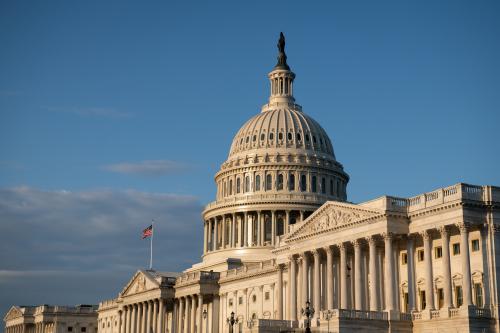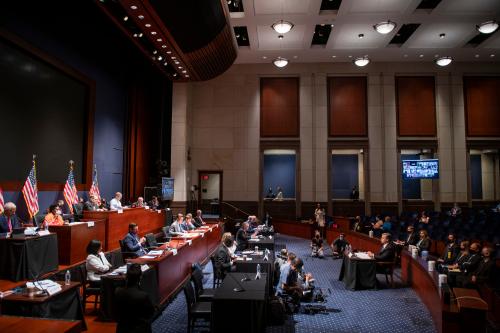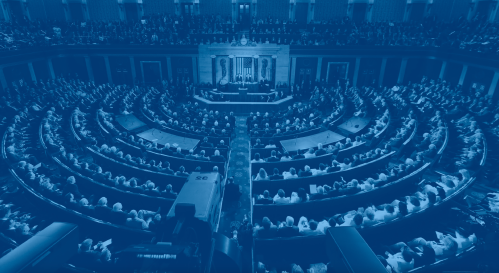The 117th Congress is off to a historic start. The January 6th insurrection, former President Trump’s second impeachment, and the passage of major economic legislation have all consumed lawmakers’ time. Still, legislators continue to conduct oversight aimed at holding both the Trump and Biden administrations accountable for their actions—even if they have gotten off to a slower start than in the last Congress.
When Democrats gained control of the House at the start of the 116th Congress, committees sent out a total of 85 oversight letters and held 20 oversight hearings in January and February of 2019. This year, in contrast, House committees only sent 34 oversight letters and held eight oversight hearings in the same time period—a difference likely attributable to a busy legislative agenda under newly unified Democratic control of Washington and to disruptions to the congressional schedule following January 6th.
Here are three major themes of oversight so far in the 117th Congress:
Continuing a trend from the end of the 116th Congress, members are focusing the largest portion of oversight efforts on issues related to the pandemic.
So far, 30% of congressional oversight letters and 40% of hearings were related to the federal government’s pandemic response. [1] Committee members continue to direct some pandemic-related oversight inquiries to private companies, rather than government officials. Two letters, sent on January 26th to the CEOs of Safeguard Medical and AutoMedx from the House Committee on Oversight and Reform, request information on contracts with the federal government regarding the purchase of ventilators potentially not suited for treating COVID-19. These purchases, totally nearly $70 million, are being investigated for potential fraud.
Similarly, the House Select Subcommittee on the Coronavirus Crisis and the Committee on Small Business sent letters to the CEOs of RER Solutions, Rocket Loans, and Rapid Finance to inspect more potential waste of taxpayer funds. Chairs Clyburn and Velázquez ramped up their investigation into the management of the Economic Injury Disaster Loan program. The Select Subcommittee also sent letters requesting information on the impact of the pandemic in meatpacking plants, as thousands of workers contracted coronavirus, leading to many deaths.[2] Despite large outbreaks and clear safety issues, Democrats assert that the Trump administration failed to enforce worker safety laws and issue proper penalties.
While COVID response has been a focal point of oversight efforts, the House has also been concentrating on a variety of other issues. Particularly, oversight of the Capitol complex security apparatus, addressing IRS issues for the 2021 filing season, and retroactive oversight of ICE and CBP immigration policies.
Emboldened by unified party control, congressional Democrats have started asking for oversight information that was previously withheld by the executive branch.
During the 116th Congress, the Trump administration was notorious for withholding information and choosing not to respond to oversight inquiries. At least five letters to the Biden administration have referred directly to information requests that were initially ignored by Trump officials. In a February 8th letter to the Acting Secretary of Health and Human Services, Chair Clyburn references “two subpoenas and at least 20 document requests” that were ignored. On the same day, the Select Subcommittee sent a similar letter to White House Chief of Staff Ron Klain outlining several ongoing inquiries related to the previous administration’s failed COVID-19 response and requesting documents that could help congressional investigators.
Congressional Democrats are also reigniting legal fights to obtain information related to executive branch activities. On February 23rd, for example, Oversight and Reform Committee Chairwoman Carolyn Maloney reissued a subpoena to Mazars USA requesting access to the former President’s financial records. House lawyers plan to argue in court that Trump’s removal from office should provide greater legal standing for Congress to obtain documents related to his finances.
The Biden administration, however, has yet to signal exactly how much information it plans to share. Officials are currently negotiating with congressional Democrats about whether to enforce a Judiciary Committee subpoena that would require former White House counsel Don McGahn to testify on matters related to former President Trump’s first impeachment trial. Any precedent the administration sets for sharing documents and allowing witness testimony could affect future oversight efforts, including by Republicans if they win majorities in either legislative chamber in 2022.
The Senate lags behind the House in producing oversight actions—most likely because of competing institutional priorities and delays in agreeing to an organizing resolution.
In January and February, Senate committees engaged in less executive branch oversight than their House counterparts, holding only two hearings and sending five letters. This difference, however, is likely attributable, at least in part, to two key distinctions between the chambers. First, while Democrats’ control of the chamber was solidified by their victories in Georgia’s runoffs on January 5, the Senate did not agree to an organizing resolution until February 3; this delay in transferring committee leadership likely slowed down Democrats’ ability to start pursuing their oversight agendas. Second, because the start of the Congress also featured a presidential transition, over half of all Senate committee hearings in the first two months of the Congress were related to executive nominations for positions in the Biden administration. [3]
Conclusion
While some trends have begun to emerge, the full oversight picture of the 117th Congress is yet to be seen. For Democrats in the majority, the list of executive branch actions they can choose to oversee is quite large though many factors, including the level cooperation from the Biden administration and a packed legislative agenda, will impact the effectiveness and scope of any future oversight actions.
[1] Oversight letters and hearings are tracked using the Brookings House Oversight Tracker. The methodology used for identifying oversight actions can be found in the hyperlink.
Oversight Letters: 12 out of 34 letters sent by House Committees and 0 out of 6 letters sent by the Senate have been related to the COVID-19 Pandemic.
Oversight Hearings: 3 out of 8 oversight hearings held by House Committees and 1 out of 2 Senate committee hearings were related to the COVID-19 Pandemic.
[2] The Select Subcommittee also sent letters to the CEOs of Tyson Foods, Smithfield Foods, and JBS USA Holdings.
[3] 38 out of 66 Senate hearings held between January and February of 2021 were about processing President Biden’s executive nominations.
This work is licensed under the Creative Commons Attribution-NonCommerical-NoDerivatives 4.0 International License. To view a copy of the license, visit https://creativecommons.org/licenses/by-nc-nd/4.0/.









Commentary
Early oversight in the 117th Congress: Three takeaways
March 25, 2021